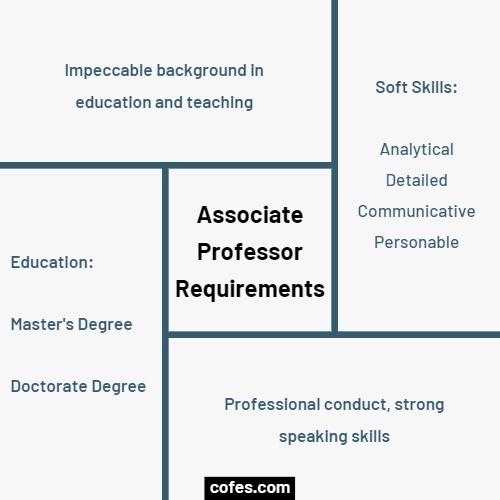An Associate Professor is a position in American academics between an Assistant Professor and a Full Professor.
As an Associate Professor, you are likely on the track to tenure or have already secured tenure.
Tenure is an indefinite academic appointment that can only be terminated for misconduct or exceptional circumstance.
Tenure serves to protect academic freedom and shield those Professors from being repressed or targeted for their views and teaching.
An Associate Professor must juggle teaching responsibilities, conduct research, secure grants for said research, assist in administrative tasks, mentor graduate students, attend conferences, and speak at events relevant to their field.
Associate Professor Overview
| Official Job Title | Associate Professor |
| Average Salary | $80,691 |
| Stress Level | Above Average |
| Work-Life Balance | Below Average |
| Job Satisfaction | Above Average to High |
| Career Advancement | High |
>>MORE: Summer Jobs That Pay Well for High School Students
Job Description for an Associate Professor
What does an Associate Professor do?
Associate Professors are accountable for a large number of responsibilities.
As an Associate Professor, you are responsible for teaching several classes within your field.
This includes the development of a strong course syllabus, recruiting lecturers and other teaching staff, regularly delivering your course material, and offering personal availability or office hours to your students.

What Does an Associate Professor Do on a Daily Basis?
At this level of a tenured professor, you will be responsible for assisting and mentoring lower leveled colleagues such as teaching assistants and supporting grad students in their course work.
This involves regular interviews with students looking to qualify for post-graduate studies and organizing events for current students to network with experts in their field of study.
Responsibilities and Roles of an Associate Professor
As an Associate Professor, you will have a variety of responsibilities, from managing and teaching coursework to engaging and inspiring your students.
You are also expected to conduct research and exhibit findings through journal publications and guest-speaking seminars significant to your field.
You will also be responsible for writing proposals and networking to secure research funding.
This funding will be used for research and pursuing higher education and experience.
You are also expected to collaborate with assistant and full-time professors and demonstrate impeccable administrative proficiency.
You will be organizing and attending department meetings.
You will be writing proposals and helping guide the program’s overall direction.
>>MORE: Fun, High-Paying, Low-Stress Jobs Without A Degree
Associate Professor Salary
Associate Professor Starting Salary
With the plethora of responsibilities placed on an Associate Professor, the financial compensation in the current American economy is quite competitive.
An Associate Professor is more than likely tenured, making their position far more stable than that of a Teaching Assistant or an Assistant Professor.
Entry-level pay starts at $60,000 and tops out at around $120,000 with more prestigious schools.
With the current market, many universities are offering higher base pay with the same relative experience.
Factors determining Associate Professor salary
- Location:
- Within the industry, you have several factors that will determine your salary.
- For example, an Associate Professor in Pennsylvania will not command the same wage as an Associate Professor in California, with all other experience being the same.
- Place of employment:
- Another determining factor for pay will be which school or university employs you.
- The average salary for an Associate Professor at Yale is $142,114.
- That is nearly 30% higher than the national average.
- Field of study:
- Yet another factor is the field of study you teach.
- The average salary of an Assistant Professor in Anesthesiology is nearly $270,000, well over double the national average.
>>MORE: The Highest-Paying, Lowest-Stress Jobs for 18-Year-Olds
How to Become an Associate Professor
Education Requirements
Becoming an Associate Professor is not a short process.
It requires a minimum education level of a Master’s Degree, with many positions requiring a Doctorate Degree.
How long does it take to become an Associate Professor?
Within the United States schooling system, an Undergraduate degree can take an individual 4 to 5 years.
Postgraduate or Master’s Degree will take another 2 to 3 years.
On top of this, the doctorate will take an average of 4-6 years.
For many, it may take up to 8, depending on their field of study.
From first entering college, an individual is looking at a minimum of 10 years to obtain their doctorate, with many people taking 15, if not 20, years to complete their doctoral studies.
Is it Hard to Become an Associate Professor?
Becoming an Associate Professor requires more than just a dedication to your education.
On top of the education requirements, you will also need an impeccable track record in teaching in an academic setting.
Most schools seek four or more years of teaching experience in a classroom setting.
Given the broad range of responsibilities, you must also show strong organizational and exceptional speaking skills.
On top of all of this, you will also need to comport yourself professionally and demonstrate an excellent work ethic.
Taking all of the time, education, and personal requirements into consideration is a challenging and lengthy process to become an Associate Professor.

>>MORE: Jobs, Pay, Responsibilities, and More for Yoga Instructors
Career Path of an Associate Professor
Associate Professor Roadmap
Given the extremely lengthy schooling and research required to become an Associate Professor, it is advisable to know that this career path is right for you.
Becoming an Associate Professor requires an unyielding passion for both learning and teaching. A career in academics can be both fulfilling and challenging.
You will need to navigate your higher education before entering the world of academic teaching as either a teaching assistant or an Assistant Professor.
After several years at this level of teaching, along with your own research and contributions to your field of interest, you will enter the tier of Associate Professor.
For many, this represents decades of work and study, but this is by no means where your career stops.
Different Opportunities for Associate Professors
From here, you may continue your teaching career to become a full-time professor.
You may also decide to take time for your research and continue contributing to your field of study as an academic author instead of an instructor.
Many at the Associate Professor level find ample career opportunities within their field if they are willing to relocate to other Universities.
If tenured, an Associate Professor can continue their career advancement as Department Head or University President or College Dean.
Is an Associate Professor a Good Career?
Overall, the position of Associate Professor is an excellent career, albeit one that does require a lot of forethought.
Given the schooling requirements, it is nearly impossible to become an Associate Professor without the minimum schooling requirements.
>>MORE: Electrical Installer Job Description, Pay, Tasks, and Additional Information
Working Conditions
What are the working conditions like?
The work of an Associate Professor is almost always conducted indoors.
You will most likely spend most of your time inside, apart from potential fieldwork and research.
What is an Associate Professor’s schedule like?
As a professor, you will be responsible for several classes held at specific times each week, but your approach and course requirements are entirely up to you.
You must employ rigorous scheduling and self-discipline to grade assignments and tests, conduct research, and hold mandatory office hours.
How many hours do Associate Professors work? Can you work part-time?
Most Associate professors work at least 40 hours a week, many working more than that when factoring in grading and work during personal time.
Given Associate Professors’ responsibilities, it is considered a full-time position with no ample opportunity for part-time work.
Can Associate Professors work remotely?
Given the current global climate, remote work has become a high priority for many individuals.
Teaching has been at the forefront of the remote work movement.
The opportunity to work remotely as an Associate Professor varies greatly with which school you are interested in working for.
Each school will have different policies governing their remote work opportunities, but more and more schools offer fully adapted coursework to distance education.
Vacation and leave for Associate Professors
There is a misconception that professors get summers off as their students do.
Being a professor is a full-time job, and most use the summer months to rework their course projections or pursue their research.
Vacation and sick leave are negotiated in the contract like any other job.
>>MORE: Wedding Coordinator Job Description: Benefits, Pay, Responsibilities, and More
Alternative Careers & Similar Jobs to an Associate Professor
- School Counselor
- Personal Assistant
- Administrative Assistant
- Forensic Science Technician
- Natural Sciences Manager
- Archaeologist
- Food Scientist
- Public Relationship Manager
- Executive Assistant
- Administrative Manager
Resume Tips
Here are a few tips when writing your resume to become an Associate Professor.
- When writing your resume, you want to be sure to include your level of education.
- Include what schools you attended, what degree you achieved, and what years you were in attendance.
- Be sure to include a professional summary that represents a well-rounded and emphatic interpretation of your professional career.
- You will also want to include your skills.
- This can include what programs you are familiar with, soft skills in listening and speaking one on one, and time management.
- Have a list of your relevant job experience.
- This will consist of where you worked and the years you worked there.
- Include all of your responsibilities under each job heading.
- You may also include who you worked for during that time.
>>MORE: Job Description, Pay, Responsibilities, and More for Technical Support Specialists
Interview Questions
Here are a few standard questions many applicants get when applying to become an Associate Professor.
Q1 How do you handle a graduate student who is struggling with their thesis?
Why it works: This line of questioning highlights how you communicate on a personal level as well as how you motivate your students.
This will also show your level of empathy and understanding.
Q2 Tell me about an exceptional lecture you delivered and why it stands out.
Why it works: This illustrates your understanding, planning, and execution of researched materials.
This is an opportunity for you to showcase your depth of knowledge in your field of academics.
Q3 What has been your favorite part of your academic career? Your least favorite?
Why it works: This is an insight into your interests and what drives your work.
Answer carefully, as this also indicates where you may struggle in this position.
You can find many helpful questions for all levels of academic instructors here.
>>MORE: Quality Engineer: Job Overview, Pay, Responsibilities, and More
Jobs Related to Associate Professor
Similar jobs include:
- Assistant Professor
- Instructor
- Full professor
- Senior Lecturer
- Adjunct Professor
- Associate Lecturer
- Postdoctoral Fellow/ Researcher
- Reader
For HR Managers: Tips For Hiring an Associate Professor
If you are a hiring manager looking to hire an Associate Professor, here are a few key qualities to search for in your candidates.
Minimum education
They should have a Master’s Degree, but a Doctorate is preferred.
Minimum years of experience
They will need at least four years of experience in an academic teaching setting.
Personal skills
They should possess strong interpersonal skills to effectively communicate with staff, colleagues, students, and peers.
They must also demonstrate strong organizational skills.
Key Qualities and Characteristics
They should have a pleasant disposition and display empathy while having a record of being able to inspire their students and superiors.
As in any job, look for a candidate with a strong character and a dedication to their discipline.
>>MORE: Good Job Search Tools (& How They Function)
